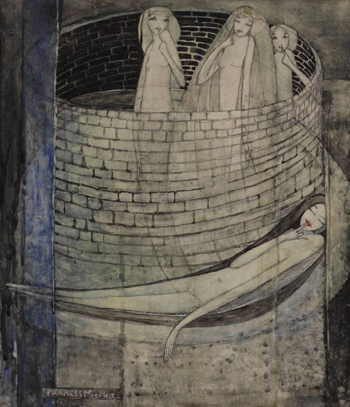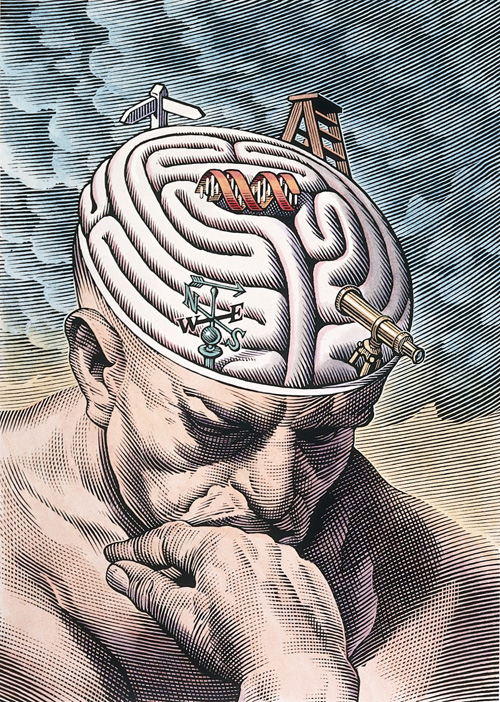
Your complimentary articles
You’ve read one of your four complimentary articles for this month.
You can read four articles free per month. To have complete access to the thousands of philosophy articles on this site, please
Articles
What Makes A Philosopher?
Siobhan Lyons hunts down a philosopher’s essential ingredients.
Just what makes a philosopher? It’s ostensibly such a basic question, but the answer is more complex than it may at first seem. So what makes someone a philosopher? And how does one become a philosopher?
Since the word ‘philosophy’ comes from the Greek for ‘love of wisdom’, we could just say that anyone who has a love of wisdom is a philosopher, and leave it at that. But if we look at those who have been granted the title of ‘philosopher’ down the ages, what distinguishes them from the ‘everyday’ lover of wisdom?
The first Western philosopher of whom we have any record was Thales of Miletus (c.624-545 BC). The story goes that Thales was staring so intently at the stars as he was walking along that he fell into a well. (Ironically, Thales’ philosophy revolves around water.) This fable was first chronicled in Plato’s Theaetetus (c.369 BC), and has since become a popular anecdote about philosophy, not only in indicating the value of ideas over the material world, but in terms of worldly foolishness, as in the fable Thales’ rescuer mockingly proclaims that one ought to keep one’s eyes on the earth and not on the skies. Other critics have made similar jibes, such as a reviewer of Somerset Maugham’s novel Of Human Bondage, who said its central character, Philip Carey, was “so busy yearning for the moon that he never saw the sixpence at his feet.” This criticism inspired the title of a later novel by Maugham, The Moon and Sixpence.
So the philosopher is, at heart, an idealist. Where there is wisdom, there is foolishness. But without apparent foolishness, there can be no wisdom.
Time & Being (a Bad Conscience)

Truth Lies at the Bottom of the Well by F. MacDonald (c.1912-1915)
Simon Critchley makes an astute observation regarding the essential difference between philosophers and lawyers. In contrast to the lawyer, he says, “who has no time, or for whom time is money”, there is the philosopher, “who takes time.” “The freedom of the philosopher,” Critchley argues, “consists in either moving freely from topic to topic or simply spending years returning to the same topic out of perplexity, fascination and curiosity” (‘What is a Philosopher?’, The New York Times, 2010).
So the philosopher is one who has time: not only time to think, but time to observe. This might explain why a vast number of philosophers were outcasts; in their isolation they had time to commit themselves to pursuits beyond social gatherings.
In addition to having time, the philosopher is often legitimately at odds with the time in which they live. I say ‘legitimately’, because there are also those who are provocative for the sake of being provocative; purposefully belligerent simply out of a desire to be seen as different. Yet as Friedrich Nietzsche notes, a genuine philosopher is “a person of tomorrow and the day after tomorrow… his enemy has always been the ideal of today” (Beyond Good and Evil, 1886, p.106). For Nietzsche, the philosopher’s task lies in “being the bad conscience of their age.” This would include Spinoza, Marx, and Nietzsche himself, while discounting someone like Jordan Peterson, who is beloved by many and deliberately courts controversy for its own sake. As Richard Gilmore similarly notes (in Doing Philosophy at the Movies, 2005, p.26), “The philosopher is one who necessarily stands outside of society, but he or she does so for the sake of society.” He goes on to say that “The philosopher must stand outside of society in order to understand the forces that impinge upon us as members of a society, of a community. From inside we do not see: we conform and abide. It is only by going outside that one gets a perspective on what those forces are that demand conformity and abiding” (p.26). So a philosopher must invariably be somewhat separate from the society they comment on if they hope to be in a position of the ‘informed outsider’.
The Conceptual Persona
The French philosopher Gilles Deleuze offered some practical points on what makes a person a philosopher by noting that the philosopher must create new concepts: “The philosopher is the concept’s friend; he is potentially of the concept. That is, philosophy is not a simple art of forming, inventing, or fabricating concepts, because concepts are not necessarily forms, discoveries, or products. More rigorously, philosophy is the discipline that involves creating concepts” (What is Philosophy?, 1994, p.5). Deleuze goes on, perhaps with a Gallic shrug: “What would be the value of a philosopher of whom one could say, ‘he has created no concepts; he has not created his own concepts’?” (p.6).
Indeed, each great philosopher seems to have their own great concepts. Plato had his theory of Forms and allegory of the cave; Kant put forth the thing-in-itself and the categorical imperative; and Nietzsche proclaimed the theory of the Übermensch (Superman). But for Deleuze, this connection between concept and philosopher runs much deeper: “The philosopher is the idiosyncrasy of his conceptual personae. The destiny of the philosopher is to become his conceptual persona” (p.64, emphasis mine). In other words, Plato is his own shadow in the cave, or, as Deleuze puts it, there is the ‘Socrates of Plato’ or the ‘Dionysus of Nietzsche’. Essentially, then, one is not merely a philosopher by way of philosophising alone. The true philosopher must live in and for their philosophy. Even if the philosopher acts in contrast to their own philosophy (as has so often occurred), it must occupy their thoughts unceasingly.
Philosophy as a Necessary Virus
A simple yet efficient definition of a philosopher is found in the online Urban Dictionary, known for its colloquial, straight-forward approach. One user, ‘Gottlob Frege’, defines ‘philosopher’ as “the best kind of person. A person that just thinks about things, which then enables other people to do things.”
There is something in this. A philosopher’s work grounds the reasoning behind other professions. Without a philosophical foundation, various other professions can lose their meaning and their moorings. For instance, a doctor can save lives; but why save lives? And what to do in borderline medical situations where hard choices have to be made? Ethicists have historically argued over the value of a human life, and their ideas can sometimes be useful to doctors facing hard decisions. Examples of other professions that at least sometimes rely on philosophy: psychiatrists, AI researchers, politicians, mathematicians, statisticians, beauticians. Okay, maybe not beauticians. On the other hand, why not? The study of beauty is at the heart of a well established branch of philosophy called aesthetics.
A more self-referential interpretation of the idea that a philosopher enables other people to do things is that a philosopher is one whose work lends itself to the production of more philosophy. If they are good, then their work begets more work, as other philosophers develop or criticize or respond to their ideas. Philosophy is not merely derivative, but nor is it isolated: it spreads itself around. In this manner, philosophy becomes a kind of necessary virus, which causes a constructive fever in others, compelling them to be and to do more than just survive. It is not there to appease or to make people feel better; it is there to provoke a constant restlessness of being. Therefore, the philosopher must produce ideas and concepts that lend themselves to producing other ideas and concepts. The better philosophers read everything – elite, trashy, or otherwise – to get a better picture of the world in which they’re living. As Joshua Krook argued in a recent article, specialisation has produced a narrowing of skill sets and thinking, “creating a dampening effect on innovative thought and creativity.” Innovative ideas, by contrast, “tend to come not from specialised experts, but from generalists.” (‘Expert Culture Has Killed the Innovator in Workplaces’, The Conversation, 2017) Or as Mark Anderson puts it in his analysis of Plato’s Dialogues, “the philosopher is one who possesses not only the Stranger’s dialectical skills but Plato’s much wider array of talents as well” (Plato and Nietzsche: Their Philosophical Art, 2014, p.162).

The Gyri of the Thinker’s Brain… by B. Sanderson (1997)
Wellcome Collection. cc by 4.0
Knowing Nothing
Some definitions or approaches to philosophy and philosophers aren’t entirely persuasive. Bikrama Bahuguna argues that “if philosophy is search of truth, a philosopher is one who is perpetually busy with the search of truth” (Layman’s Introduction to Philosophy and Life, 2009, p.123). Linking philosophy and truth is a common approach; but I believe that philosophy is less a search for truth and more of an engagement with possibilities; those that exist and those that are yet to exist. Philosophy deals with things as they are and things as they might and perhaps ought to be. A philosopher is therefore one who does not profess to know everything. Philosophy is not dependent on an excess of knowledge, but on a respect for knowledge, and, therefore, an awareness of its limits. Socrates famously said that he was wiser than others in one respect only: that at least he knew that he knew nothing. Let’s say at least this: we know less than we will know tomorrow, even if we know more than we knew yesterday, and we will never know everything. This is why philosophy is dependent on philosophers, plural, and why it resembles a necessary virus. The philosopher must therefore be one who utilises the work of other philosophers, and allows their work to be used by others.
So if you are foolish, idealistic, produce new concepts, are at odds with your time yet have time on your hands, and are aware of your own unawareness, you may just be able to call yourself a philosopher. But the greatest philosophers do not philosophise in order to call themselves a philosopher. They philosophise simply out of the Will to Philosophise.
© Dr Siobhan Lyons 2018
Siobhan Lyons is a scholar at Macquarie University, where she earned her PhD in media and cultural studies.









